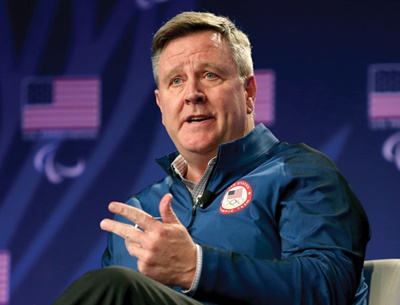The U.S. Olympic Committee has agreed to accept a lower share of sponsorship sales in a possible Los Angeles 2024 Olympics than in most of the recent American bids, and also took a lower number than the original LA 2024 budget indicated.
According to a contract made public in late September, the USOC will receive 20 percent of the first $2.16 billion in sponsorship revenue generated by a joint venture with LA 2024 that would be created to sell the Olympics, with a baseline guarantee of $294.8 million. That minimum is 20.5 percent of the bid’s budgeted sales goal of $1.43 billion.
 |
Photo by: GETTY IMAGES
|
“It’s fantastic, and I think noteworthy in terms of the strength of our partnership with L.A. that we were able to get through that so quickly.”
SCOTT BLACKMUN
CEO, U.S. Olympic Committee
That’s lower than the percentage it agreed to in Boston 2024’s aborted bid (27 percent), the 2002 Salt Lake City Olympics (30 percent) and the 1996 Atlanta Games (50 percent), according to a report commissioned by Massachusetts Gov. Charlie Baker last year and produced by The Brattle Group. The failed Chicago 2016 bid is an exception; that deal would have given the USOC 18 percent, according to a Civic Federation report. (The New York City 2012 terms were never made public.)
The USOC’s willingness to accept less reflects two factors, said veteran Olympic sponsorship salesman Rob Prazmark: Its greatly improved financial condition compared with the 1990s and 2000s, thanks in large part to NBC broadcast rights; and its motivation to remove any friction from the Los Angeles bid in light of the extraordinary stakes for the American Olympic movement.
“It’s fantastic, and I think noteworthy in terms of the strength of our partnership with L.A. that we were able to get through that so quickly,” said USOC CEO Scott Blackmun. The USOC and LA 2024 declined further comment pending International Olympic Committee approval of the documents.
LA 2024 originally budgeted a $386 million distribution to the USOC, according to documents released in 2015.
The guaranteed revenue is 25 percent less than what the USOC would be entitled to under the spirit of the joint venture concept, created by the IOC in 1988 to predetermine the conditions under which the host city and its national committee share rights and income for six years leading into an Olympics.
The USOC guarantee is designed to replace what it would have otherwise made during that period — which the USOC has calculated as $393 million, according to the contract.
The $294.8 million figure is a baseline, though. If sales go well, the USOC would continue to receive 20 percent of all LA 2024 sales up to $2.16 billion, and 15 percent of earnings after that.
Terms of the joint venture historically have been a major sticking point. A deal with the failed New York bid in 2005 wasn’t closed until hours before the IOC vote.
“In the early hours before the vote, the USOC and NYC 2012 still had not agreed to terms,” Prazmark said. “The word was already out within IOC membership there was a problem between the two organizations. It was one of many things that doomed a great NYC 2012 bid.”
The joint venture is more prone to problems in the United States because of the lack of direct federal funding in the American Olympic system. Both the USOC and the Los Angeles bid depend almost entirely on private revenue streams.
Broadly speaking, the joint venture is designed to balance two goals that, at least in theory, could be at odds: Maximize revenue for the 2024 Games, and protect the USOC’s interests in maintaining a robust Olympic movement indefinitely. The IOC wants the terms of that partnership laid out ahead of time.
“It is needed to maintain consistency and control in the host market,” Prazmark said. “The IOC does not want to manage the process, legalities, egos or money in the winning territory.”
Here’s how the joint venture works, should L.A. win the Games:
Upon the IOC vote, L.A. would sign the host city contract with the IOC and the new body would be formed. It would be led by a six-person board, with four appointees from LA 2024 and two from the USOC, including both CEOs. Despite the nominal local control, explicit USOC consent is required for key actions such as hiring or firing the joint venture’s CEO; final determination of category definitions and pricing; and any use of USOC assets and joint sales efforts with NBCUniversal, among others.
The joint venture would assume control of the Olympics’ entire intellectual property portfolio in American territory for six years beginning Jan. 1, 2019, including both general Team USA marks and LA 2024 marks. It would have until Dec. 31, 2018, to strike a broader deal with the IOC around the marketing of the Los Angeles Olympics.
Once that deal is in force, all USOC sponsors as of the IOC vote in September 2017 would get a 60-day first-right-of-negotiation period (but not a right to match) to extend their deal with the joint venture into the “joint marketing period,” which lasts from Jan. 1, 2019, to Dec. 31, 2024.
If the current sponsor doesn’t strike a deal, the category is then open to the market for the joint venture to sell. The agreement creates a bright-line cutoff to all current deals with the USOC after the Tokyo Games, in December 2020.
Up until three months prior to the IOC vote, or June 13, 2017, the USOC may continue to sell rights that expire in 2020, but any revenue generated by those deals during the years 2019 and 2020 would be directed to the joint venture. (The USOC agreed to halt all sales separate from the joint venture three months prior to the vote.) The USOC has at least 11 current sponsorships that expire in 2020.
The deal covers only domestic sponsorships. The IOC’s global TOP program will continue to function normally and make separate distributions to the USOC and LA 2024.
The joint venture does have some limits. The USOC will keep control over targeted philanthropic donations to Team USA, income and expenses relating to Olympic trials, and the operation of USOC training sites, for instance. LA 2024 will maintain exclusive control over the torch relay, ticketing and commemorative coins, stamps, etc.
Prior to the joint venture taking effect, the USOC and LA 2024 also may agree to reserve certain categories for the joint venture.





